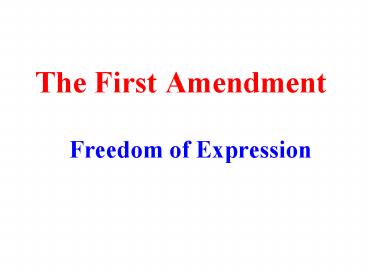The First Amendment - PowerPoint PPT Presentation
1 / 11
Title:
The First Amendment
Description:
Freedom of Speech and Freedom of Press guarantees are meant to: ... Freedom of Speech and Press do not protect: Libel, the false and malicious use of written words ... – PowerPoint PPT presentation
Number of Views:627
Avg rating:3.0/5.0
Title: The First Amendment
1
The First Amendment
- Freedom of Expression
2
The Free Exchange of Ideas
- Freedom of Speech and Freedom of Press guarantees
are meant to - Protect each persons right of free expression,
whether spoken, written, or communicated in any
other way. - Protect all persons right to a complete
discussion of public affairs.
- Freedom of Speech and Press do not protect
- Libel, the false and malicious use of written
words - Slander, the false and malicious use spoken words
- Obscenity
- Words that incite others to commit crimes
3
Seditious Speech
Sedition is the crime of attempting to overthrow
the government by force, or to disrupt its lawful
activities by violent acts. Seditious speech is
speech that urges such conduct.
- Congress has enacted three major laws to prevent
sedition and seditious speech - The Alien and Sedition Actsmade scandalous or
false criticism of the government illegal.
Expired before Thomas Jefferson took office in
1801. - The Sedition Act of 1917made it a crime to
encourage disloyalty or spread anti-government
ideas during a time of crisis. Upheld by the
Supreme Court in instances of clear and present
danger. - The Smith Act of 1940forbade advocating violent
overthrow of the government, and belonging
knowingly to any group that does. The Supreme
Court still upholds the constitutionality of the
law, but over time has modified it so that it is
difficult to enforce.
4
Obscenity
- Obscenity laws are enforced under the postal
power (Article I, Section 8, Clause 7 of the
Constitution).
Obscenity Test laid out in Miller v. California,
1973
1) The average person finds that the work appeals
to prurient interests judging from contemporary
standards. 2) The work describes offensive sexual
conduct that is specifically outlawed as
obscene. 3) The work lacks serious value of any
variety.
5
Prior Restraint
- In most cases, the government cannot curb ideas
before they are expressed. It can punish ideas
after they are expressed.
6
(No Transcript)
7
Symbolic Speech
- Symbolic speech actions/objects replace
words(black arm band) - Pure speech-words only
- Speech plus-words action(marching, singing,
Picketing) - Picketing, the patrolling of a business site by
workers on strike, is a prevalent form of
symbolic speech.
- Supreme Court rulings show that the blanket of
symbolic speech covers only so much. It does not
cover destroying draft cards (United States v.
OBrien, 1968) but it does encompass flag burning
(Texas v. Johnson, 1989, and United States v.
Eichman, 1990).
8
The Constitutions Guarantees
- The Constitution guarantees the right of the
people peaceably to assemble, and to petition the
Government for a redress of grievances. - The right to assemble, or gather with one another
to express views. - The right to bring views to the attention of
public officials.
9
Time-Place-Manner Regulations
- The government can make and enforce rules
regarding the time, place, and manner of
assemblies.
- An example of such a rule is that public areas
near schools and courthouses are restricted. - The governments rules must be content neutral.
They can place restrictions of the basis of the
time, place and manner of the assembly, but not
on what the assembly is trying to say.
10
Public Property
11
Private Property
- The rights of assembly and petition do not give
people a right to trespass on private property. - States can interpret their constitutions to
require owners of private property, such as
shopping centers, to allow people to petition on
their property.































